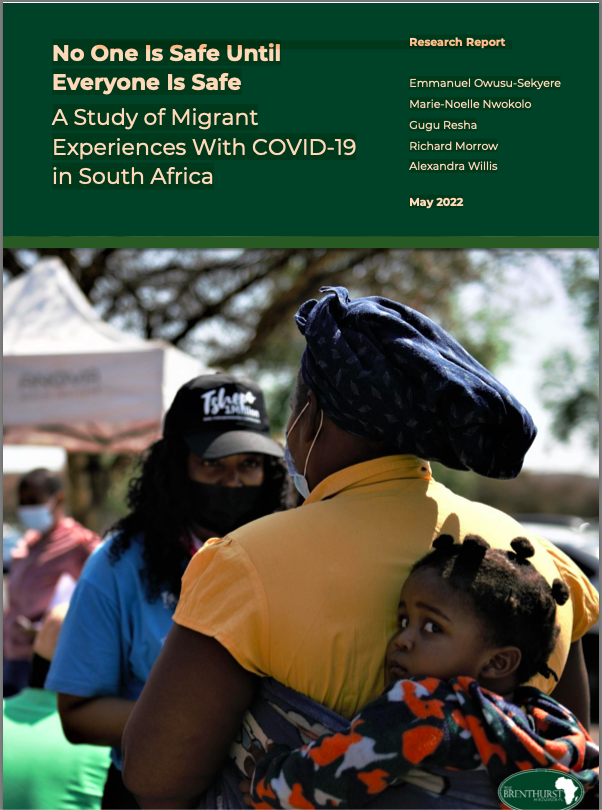
Brenthurst Research: No One Is Safe Until Everyone Is Safe
Keywords: non-national, statelessness, resilience, migrants
In the wake of the COVID-19 pandemic, South Africa experienced one of Africa's highest COVID infection rates. Consequently, the country was plunged into a deep economic crisis evidenced by high inflation rates, skyrocketing unemployment rates, especially among the youth, and high poverty rates. This culminated in deep frustration among the local citizenry, who blamed the proliferation of non-nationals in South Africa for their poor conditions. Such frustrations turned into violent acts towards the non-nationals as they were accused of criminal acts and other harmful activities. Through this revelation, the Brenthurst Foundation conducted a study to focus on some of the challenges the foreign non-nationals experienced during the pandemic and how they built resilience against the disease and the socio-economic impacts of the pandemic.
In carrying out this study, the Brenthurst Foundation focused its research on the top three migrant communities in South Africa, which also happen to be South Africa's leading economic zones. These migrant communities, Gauteng, KwaZulu-Natal, and Western Cape, were severely hit by the pandemic and recorded high infection rates.
Using the United Nations World Risk Index (WRI), the study tried to identify the coping strategies utilized by non-nationals to survive during the pandemic. Around 200 non-nationals identified as asylum seekers, refugees, and documented and undocumented migrants were studied. Local and international institutions that work directly and indirectly with non-nationals were also consulted. The WRI assessed resilience based on the following: level of risk, susceptibility, coping, and adaptation strategies.
KEY FINDINGS
The following are some of the main findings of the study:
-
Due to a lack of proper documentation, most migrants were rendered irregular (illegal), making it hard to access services, work, or school.
-
Government intervention schemes were discriminatory and exclusionary.
-
Children born to non-nationals were rendered stateless with no identity making it hard to access educational services, among other things.
-
There is a lack of data on migrants in South Africa, especially undocumented ones, posing a challenge for policy intervention.
-
Migrants with expired documents faced challenges accessing medical healthcare during the pandemic, like COVID-testing, getting vaccines, etc.
-
Stereotyping non-nationals by associating them with crime has fueled tensions between them and the locals endangering their lives and livelihoods.
-
Migration management policy in South Africa does not accommodate migrants-it is reactive and troubleshooting in nature. Programs to integrate migrants into South African society are non-existent.
-
The Home Affairs processing centers for asylum seekers have been closed since 2012 in Western Cape.
-
Most migrant interventions are from faith-based organizations, advocacy groups, law firms, and non-profit organizations instead of the government.
What can be done?
Respondents consulted for this study suggested a few actions the government could take to mitigate some of the socio-economic impacts of the pandemic and the plight they face being undocumented.
-
Documentation: Through technological innovation, processing centers should have online platforms for migrants and asylum seekers to renew their expired documents.
-
Partnerships: Data collection on migrants for policy intervention purposes can be more accessible by collaborating with private entities like phone companies, NPOs, and NGOs that work directly with migrants to broaden their reach.
-
Future-Proofing: Update the Electronic Vaccination Data System (EVDS) to use the date of birth instead of ID numbers for registration (making vaccines accessible for undocumented migrants)
-
Statelessness: Using policy differentiation to avoid systemic abuse, the government can work with several international organizations like UNICEF and UNHCR to end statelessness.
In a nutshell, refugees, asylum seekers, and undocumented non-nationals suffered more psychological and economic consequences of the epidemic than their documented and registered peers. The latter were better able to survive in many ways. Therefore, it was imperative that in the study's conclusion, the Brenthurst Foundation researchers suggested some policy action steps for the South African government to address some of these concerns. These action steps were divided into three-time frames: short-term (3 months), medium-term (6 months), and long-term (12 months).
Short-term (3 months)
-
Reopen processing centers for asylum applicants who need to renew their expired documents.
-
Bring in the business sector to expand everyone's reach. For example, cellphone companies ( Vodacom, Cell C, MTN, etc.)
Medium-term (6 months)
-
Create online tools for asylum seekers and refugees to renew their expired papers.
-
Form alliances with faith-based, community-based, non-profit, and international organizations to reach out to non-nationals using COVID and other relevant projects.
-
Outline a strategy for equipping South African health institutions to accommodate the increased demand for healthcare from non-nationals.
Long-term (12 months)
-
Create a plan to eradicate statelessness.
-
Improve access to healthcare in South Africa for non-nationals regardless of immigration status to achieve universal access to healthcare per the international development framework.
-
Because of resource scarcity, non-nationals may be asked to pay for essential services.
Brilliant Fane
Communications and Research Intern
SIHMA
Source: No One Is Safe Until Everyone Is Safe: A Study of Migrant Experiences With COVID-19 in South Africa — Books and Publications. (n.d.). The Brenthurst Foundation. Retrieved June 2, 2022, from https://www.thebrenthurstfoundation.org/books-publications/no-one-is-safe-until-everyone-is-safe-a-study-of-migrant-experiences-with-covid-19-in-south-africa-1/
Categories:
Tags:

